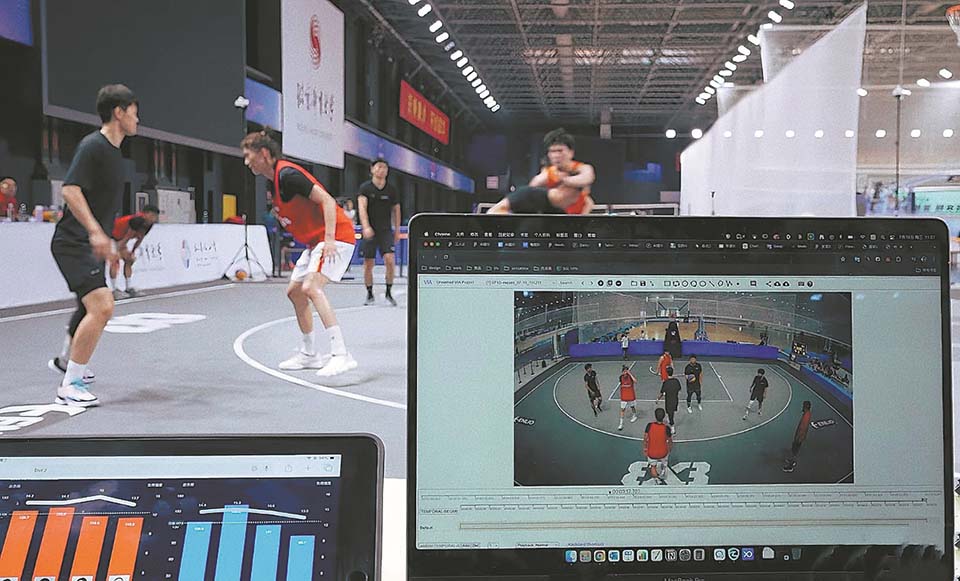August 8, 2024
BEIJING – As China’s national diving team continues its gold rush at the Paris Olympic Games, its artificial intelligence training system is making a big splash in the field of sports innovations.
Developed by Chinese tech giant Baidu, the training system has “sharp eyes and a strong brain”, said Lu Feixiang, a senior engineer at the company’s research institute.
The system captures intricate details of diving movements that traditional video systems cannot, provides immediate feedback and real-time analysis, and allows performances to be compared in detail with the previous best one.
The technology is just one example of how AI is permeating the Paris 2024 Games, referred to by some as the “first AI Olympics” due to the extensive use of AI in training, refereeing, broadcasting and even anti-doping measures.
“Diving involves executing complex movements within a brief 1.8-second window, from the jump to entering the water,” Lu said. “Perfecting every detail is crucial for Chinese athletes’ famed splashless dives.”
Traditional video recording falls short in capturing rapid sequences, and the subsequent data analysis is time-consuming and less immediate.
Based on Baidu’s ChatGPT-like product and large language model Ernie Bot, the AI system addresses these challenges by offering clear, accurate, comprehensive insights, advancing data quantification and analyzing the dives, Lu said.
“The AI system allows for timely playback and scoring. I use it to refine my technique,” Quan Hongchan, who won the women’s synchronized 10-meter platform diving event with her teammate Chen Yuxi, said before the competition.
Chen said, “AI can break down movement details, helping me master the nuances of timing and entry control.”

Visitors learn about the multi-camera replay system developed by Alibaba, and applied during the Paris Games. PHOTO: XINHUA/CHINA DAILY
Transformative event
AI and technology innovations are transforming the Paris Olympics with applications ranging from training athletes to enhanced broadcast experiences to efficient energy management.
The International Olympic Committee recognized the transformative potential of AI in the “Olympic AI Agenda” report published in April. The IOC said it aims to adopt a “holistic approach to explore the great potential of AI, while mitigating the risks”.
The agenda sets out a list of AI goals that focus on optimizing the Games, detecting talent, and reducing human bias. Many of these applications are being tested for the first time in Paris.
Thomas Bach, the IOC president, emphasized the importance of using AI to safeguard athletes from cyber abuse, with around half a billion social media posts anticipated during the Paris Games. In addition, AI is being used to create highlight videos in multiple formats and languages, he said in a statement.
“We are also using AI to make the Olympic Games more sustainable, through a very sophisticated first-ever data capture and energy management system. AI is also opening up new ways for talent identification, and this project will be launched by us globally in 2025 to live up to the commitment we made that AI in sport must be accessible to everybody,” Bach added.
The market for use of AI in sport is projected to grow from $6 billion in 2024 to $21 billion by 2029, with a compound annual growth rate of 28.69 percent, according to market research company Mordor Intelligence.

Alibaba Cloud’s exhibition area at the International Broadcasting Centre in Paris. PHOTO: XINHUA/CHINA DAILY
Boost for brands
The growth potential is reflected in Paris, where Chinese tech companies are leveraging their cutting-edge cloud computing and AI tools to enhance live broadcast experiences and athletes’ performances.
“For Chinese companies with global strategies, having a marked presence at the Olympics can be a vital accelerator to boost brand influence and international development,” said Jiang Han, a senior researcher at the Beijing-based think tank, the Pangoal Institution.
“This is a once-in-a-four-year opportunity for Chinese companies to showcase their latest innovations to the global audience, and mirror their technological prowess,” Jiang added.
Chinese tech giant Alibaba Cloud, for instance, is replacing traditional satellite methods by using its advanced technologies to support over two-thirds of the event’s broadcasts. These technologies are improving internal workflows, enhancing the viewer experience, enriching storytelling, and helping better explain some sports.
Alibaba Cloud has provided a record number of multi-camera replay systems with AI-powered, high-quality reconstruction in the cloud, to create three-dimensional models and mapping of additional viewpoints of 21 sports and disciplines. This helps deliver more compelling replays from more camera angles.
The “bullet time” multi-camera replay system, an AI-enhanced broadcasting technology developed by Alibaba Cloud, provides viewers with cinematic effects, including slow-motion and freeze-frame views, offering an immersive experience. This technology is deployed at 12 venues, covers sports including beach volleyball, tennis, judo, and rugby — and delivers high-quality replays from multiple angles.
Yiannis Exarchos, CEO of the IOC’s subsidiary Olympic Broadcasting Services, oversees the distribution of event coverage. To improve efficiency for broadcasters, Alibaba Cloud launched OBS Cloud in conjunction with OBS in September 2018, and supported the broadcast coverage of the Tokyo 2020 Summer Games and the 2022 Beijing Winter Olympics, he said.
For media rights holders and host cities, OBS Cloud is a more cost-effective alternative as Olympic Games-related content can be transmitted over the cloud, which also helps reduce an event’s carbon footprint, Exarchos added.
Basketball applications
Chinese AI pioneer SenseTime is supporting the Chinese basketball teams competing at the Olympics by providing AI-driven sports data analysis and advice on game strategies.
The company’s AI technology is being used to analyze data such as Chinese players’ movements, a basketball’s trajectory, and training efficiency.
SenseTime became the AI strategic partner of the Chinese national basketball team earlier this year, and has developed a basketball performance analysis platform in cooperation with the Shanghai Artificial Intelligence Laboratory and Shanghai University of Sport.
The platform applies AI technology to data statistics and match videos, providing decision-making support for training and game strategies.
It can analyze each athlete’s movement and the trajectory of the basketball in real time, and give immediate feedback to the coaches by constructing 3D models and leveraging 3D motion capture algorithms. The goal of the platform is to improve athletes’ training efficiency and their competition performance, SenseTime added.
Yao Ming, chairman of the Chinese Basketball Association, said, “We look forward to continuously exploring the application of AI large language models in the sports field with SenseTime, jointly promoting the development of Chinese basketball and the sports industry.”
The company’s smart broadcasting technology is also being used to cover table tennis and archery events, providing viewers with an immersive viewing experience.
Lin Yiting, director of marketing and solutions at SenseTime’s international research and development center, said the company’s InnoMotion broadcasting solution uses 3D motion capture technology without the need for wearable devices. InnoMotion was created in collaboration with Shanghai Media Tech, a media technology company.
The technology covers large-scale, multiangle scenes and captures spatial motion data in real time. In complex sports scenarios it can accurately capture and analyze fastmoving small targets such as table tennis balls and arrows, Lin said.
The rotation and trajectory of table tennis balls can be shown to viewers through augmented reality technologies, allowing them to better understand the intricacies of such Olympic sports, Lin added.

SenseTime’s AI technology helps the Chinese basketball team analyze data such as Chinese players’ movements and basketball trajectories, and training efficiency. PHOTO: CHINA DAILY
Virtual athletes
Chinese tech company iFlytek is showcasing its latest AI innovations at China House, a pavilion located in the Hotel Salomon de Rothschild in Paris.
The main attractions are two digital Chinese athletes — AI versions of swimmer Zhang Yufei and gymnast Zou Jingyuan. The “virtual athletes” are almost indistinguishable from their real-life counterparts, and have captured the attention of visitors with their lifelike appearance and expressions.
They greet visitors with phrases like “Hello, I am Zhang Yufei, pleased to meet you!”, creating an experience that feels like interacting with the real athletes.
The virtual AI athletes are equipped with advanced AI technologies developed by iFlytek, including speech synthesis, speech recognition, semantic understanding, lipmovement prediction, and image processing.
Even in the bustling and noisy environment of the pavilion, they can accurately assess the speech of visitors and respond appropriately, thanks to sophisticated multi-speaker speech recognition technology, iFlytek said.
The AI versions of Zhang and Zou can seamlessly switch between Chinese, English, and French, and engage with athletes and visitors from around the world without the need for translation devices, iFlytek added.
This ability to handle a multitude of questions from diverse cultural backgrounds showcases the power of its multilingual intelligent voice technology, the company said.
Potential to revolutionize
Another notable Chinese innovation being featured in Paris is the “smart” soccer ball embedded with a chip that can perform 500 recognition actions per second. This technology aids match officials in accurately judging handballs and offsides, enhancing transparency and refereeing.
Manufactured by Huaian Butyl Ltd, a sports equipment company in Huaian, Jiangsu province, the smart soccer balls were also used at the recent UEFA European Championship.
Zhou Hongda, general manager of Huaian Butyl, said since the beginning of this year, the company had exported more than 4 million smart soccer balls for use in events like Euro 2024 and the Paris Games, as well as for training purposes. The company has export orders until the end of this year, Zhou added.
Wang Peng, a researcher at the Beijing Academy of Social Sciences, said: “As AI technology continues to evolve, the Paris 2024 Olympics serve as a testament to its potential to revolutionize sports. The integration of AI in various aspects of sports demonstrates its capability to enhance the athletic experience, both for participants and viewers.”
“The application of China’s state-of-the-art digital tech at the Paris Games has showcased Chinese companies’ leading position in tech frontiers and their strengths in technological innovation,” Wang added.
Accountancy firm PwC also believes that AI technologies are evolving fast and growing in importance, as well as boosting the management and operations of sports institutions.
“AI has the potential to inject new vitality into the entire chain of sports training and participation, from improving fans’ viewing experience of sporting events and boosting training efficiency for athletes, to being virtual umpires and assistant coaches,” PwC said in a report.


